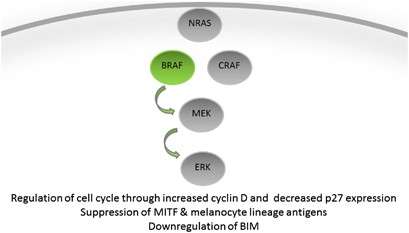
- Select a language for the TTS:
- UK English Female
- UK English Male
- US English Female
- US English Male
- Australian Female
- Australian Male
- Language selected: (auto detect) - EN
Play all audios:
The mitogen-activated protein kinase (MAPK) pathway is critical to oncogenic signaling in the majority of patients with malignant melanoma. Driver mutations in both NRAS and BRAF have
important implications for prognosis and treatment. The development of inhibitors to mediators of the MAPK pathway, including those to CRAF, BRAF, and MEK, has led to major advances in the
treatment of patients with melanoma. In particular, the selective BRAF inhibitor vemurafenib has been shown to improve overall survival in patients with tumors harboring BRAF mutations.
However, the duration of benefit is limited in many patients and highlights the need for understanding the limitations of therapy in order to devise more effective strategies. MEK inhibitors
have proven to particularly active in BRAF mutant melanomas also. Emerging knowledge about mechanisms of resistance as well as a more complete understanding of the biology of MAPK pathway
signaling provides insight into rational combination regimens and sequences of molecularly targeted therapies.
A Correction to this paper has been published: https://doi.org/10.1038/s41388-021-01716-6
Omholt K, Platz A, Kanter L, Ringborg U, Hansson J . NRAS and BRAF mutations arise early during melanoma pathogenesis and are preserved throughout tumor progression. Clin Cancer Res 2003; 9:
6483–6488.
Anyone you share the following link with will be able to read this content:








